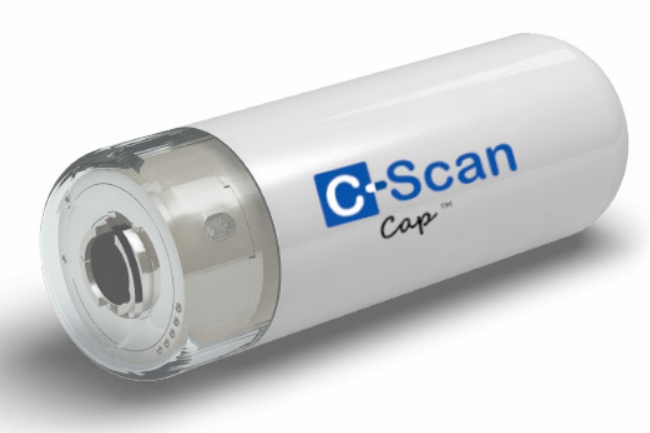30 Dec. 2019. Results from a small-scale clinical trial show an ingested capsule to diagnose potential colon tumors is safe and feasible for most patients. Findings from the first pilot study of the technology in the U.S. were reported today by the capsule’s developer Check-Cap Ltd. in Isfiya, Israel.
Check-Cap is the creator of the C-Scan system with an ingestible capsule that captures images from inside the colon to find precancerous polyps, candidates for becoming full-fledged cancerous tumors. The company says its system is an alternative to conventional colonoscopies that require extensive preparation to empty the colon, sedation of many patients, and an invasive endoscope. And the Check-Cap system does not ask individuals to collect or ship stool samples, as required by some screening technologies.
Because of these obstacles and limitations, says the company, one-third of Americans and up to 60 percent of adults age 50 to 75 outside the U.S. avoid colon cancer screenings. Yet, colorectal cancer is preventable and treatable with early detection, notes Check-Cap. Today, 1.4 million cases of the disease worldwide are diagnosed each year, leading to 700,000 deaths, including 49,000 in the U.S.
The C-Scan system asks individuals to swallow a capsule with an imaging-contrast agent. The capsule contains a tiny device emitting X-rays and a radio-frequency transmitter. As the capsule travels through the colon, says Check-Cap, the device sends out small amounts of X-rays, since it only needs to capture data from very close to the capsule. X-rays are emitted from the capsule only when it’s moving, not when stationary.
Data from the capsule are then captured by collection units worn on the individual’s torso that track the capsule’s position until it’s naturally excreted after two or three days. Data from the collection units are then downloaded to the physician’s workstation. At the workstation, C-Scan system software creates two- and three-dimensional images of the colon from the data. The images highlight suspected polyps on the colon’s interior surface, and with algorithms recreate different 3-D views of the colon’s surface, including a simulated endoscope view, like that from a colonoscopy.
The clinical trial is a pilot test of the C-Scan system in the U.S., looking primarily at its safety and compliance by patients; the technology is already tested and cleared for use in Europe. The study team at New York University and the Mayo Clinic in Rochester, Minnesota enrolled 45 healthy adults age 40 to 80 to test the system, but also to undergo a colonoscopy to verify the results.
Of the 45 participants, 40 individuals took the C-Scan capsule and completed a questionnaire at the end of the study. Of these 40 individuals, 12 participants were not considered evaluable by the study team, “after factoring in technical and physiological dropouts and protocol violations.” The disqualifying factors were not disclosed.
None of the remaining 28 individuals reported any more than mild adverse reactions to the ingested capsule, and participants reported higher satisfaction with the C-Scan system than a colonoscopy. The detection rate of precancerous polyps by the capsules with this sample, says Check-Cap, was consistent with results of the colonoscopies, and similar to findings from earlier studies of the technology in Europe.
“The results of the study are promising, both in terms of safety and patient compliance of the procedure,” says Seth Gross, principal investigator of the study and gastroenterologist at NYU medical school, in a company statement. Gross is also a scientific adviser to Check-Cap. Alex Ovadia, CEO of Check-Cap adds, “Completing our first study in the U.S. constitutes an important milestone for our company as we work towards the initiation of a U.S. pivotal study in late 2020.”
More from Science & Enterprise:
- Device Offers Real-Time Monitoring of Swallowing Problems
- A.I. Harnessed to Detect Cancer Cells
- Once-a-Month Contraceptive Pill Demonstrated
- Wearable Sensor Analyzes Sweat, Measures Chemicals
- Implanted Overdose Rescue Device Being Developed
* * *


 RSS - Posts
RSS - Posts
You must be logged in to post a comment.